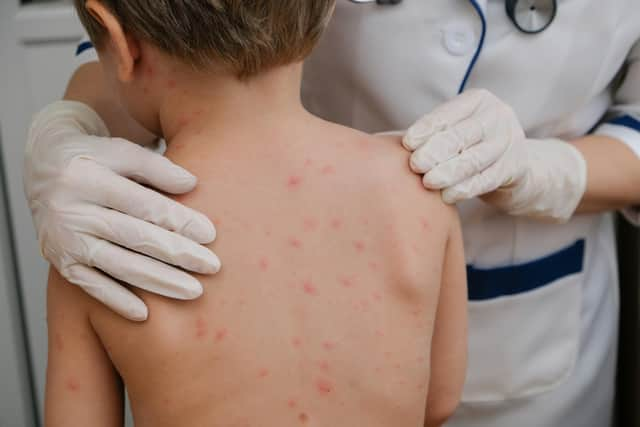Chickenpox jab Scotland: Why scientists are recommending introduction of chickenpox vaccine on NHS for all children
The chickenpox vaccine should be introduced on the NHS for young children, scientists advising the Government have recommended.
The Joint Committee on Vaccination and Immunisation (JCVI), which advises UK health departments, said the jab should be given to all youngsters in two doses when they are aged 12 months and 18 months.
Advertisement
Hide AdAdvertisement
Hide AdData from other countries suggests the vaccine – also known as the varicella jab – will prevent most severe cases in children and help "make chickenpox a problem of the past", experts said.


The JCVI has also recommended a temporary catch-up programme for older children be included, though no details on their ages are available at present. The Department of Health and Social Care (DHSC) will now look at the recommendation.
The chickenpox vaccine has been given in other countries, including the US and Australia, for many years. But the NHS has always said there is a worry that introducing it in the UK could increase the risk of chickenpox and shingles in adults.
The NHS website says that if a childhood chickenpox vaccination programme was introduced, people would not catch the virus as children, leaving unvaccinated children to get chickenpox as adults, when cases can be more severe. But thinking around the vaccine has now changed.
Professor Sir Andrew Pollard, chairman of the JCVI, said: "Chickenpox is well known, and most parents will probably consider it a common and mild illness among children.
"But for some babies, young children and even adults, chickenpox or its complications can be very serious, resulting in hospitalisation and even death. Adding the varicella vaccine to the childhood immunisation programme will dramatically reduce the number of chickenpox cases in the community, leading to far fewer of those tragic, more serious cases.
"We now have decades of evidence from the US and other countries showing that introducing this programme is safe, effective and will have a really positive impact on the health of young children."
According to the UK Health Security Agency (UKHSA), there were far fewer cases of chickenpox during the pandemic due to restrictions on socialising, meaning there is currently a larger pool of children without immunity. The catch-up programme is designed to offer them protection.
Advertisement
Hide AdAdvertisement
Hide AdWhile most chickenpox cases in children are classed as mild, some children will go on to develop complications including bacterial infections like group A strep.
In rare cases, the virus can cause a swelling of the brain, serious lung inflammation and stroke, sometimes leading to death.
Dr Gayatri Amirthalingam, deputy director of public health programmes at UKHSA, said: "Introducing a vaccine against chickenpox would prevent most children getting what can be quite a nasty illness – and for those who would experience more severe symptoms, it could be a life saver.”
Comments
Want to join the conversation? Please or to comment on this article.